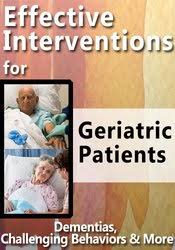🌟 New Year Offer 🌟
Celebrate 2025 with 30% OFF on all products! Use code: NEWYEAR2025. Hurry, offer ends soon!
This high-energy course is filled with interesting case studies, insightful discussions, evaluation strategies, and interventions to leave you feeling confident in your ability to intervene with Alzheimer’s and various other dementias that affect your patients.
Effective Interventions for Geriatric Patients: Dementias, Challenging Behaviors & More

Everybody ages…but there is no “one size fits all” model to aging, so you never know what your geriatric patient might experience. That’s why it’s important that EVERY healthcare professional know how to address the unique concerns of the older adults under our care.
Geriatrics is a field on its own, yet there are very little learning opportunities for this specialized population. Join two of the best, internationally recognized, geriatric experts in this revolutionary online course and get step-by-step guidance to caring for patients with Alzheimer’s Disease, Vascular Dementia, Parkinson’s disease, Frontotemporal Dementia, Lewy Body Dementia, Aggression, Depression and so many more.
This high-energy course is filled with interesting case studies, insightful discussions, evaluation strategies, and interventions to leave you feeling confident in your ability to intervene with Alzheimer’s and various other dementias that affect your patients.
Your geriatric patients have made countless memories and they aren’t done yet… enroll in this course today to get innovative and practical intervention strategies you can use immediately to improve your patients’ quality of life!
Get immediately download Effective Interventions for Geriatric Patients: Dementias, Challenging Behaviors & More
Here’s what this intensive online course covers:
- Depression
- Anxiety
- Alcohol Abuse
- Transient Cognitive Decline
- Pre-cursor to dementia
- Mild Neuro-Cognitive Disorder
- Alzheimer’s
- Vascular
- Parkinson’s
- Lewy Body
- Frontotemporal
- Reversible Conditions
- Mini-Mental State Examination
- SLUMS
- Clinical applications
- Administration and scoring
- Objective and subjective interpretation
- Therapy modalities
- Clinical indicators of depression and anxiety
- Practical application
- Early and Mid-stage Alzheimer’s – Acetylcholinesterace Inhibitors
- Mid and Late-stage Alzheimer’s – Neurotransmitter Glutamate
- Alternate interventions
- Intervention strategies for depression, poor appetite, verbal and physical combativeness, refusing ADL care
- Strategies for coping mechanisms for the caregiver and clinician
- Caregiver guilt
- Depression
- Responsibility to client
- Reporting abuse
- Power of Attorney
- Documentation
- Normal aging changes of the mind
- Depression, dementia, and delirium
- Alzheimer’s disease and other dementias
- Diagnose, differentiate, and develop a plan of care
- Stages
- Assessment
- Getting a diagnosis
- Behavioral issues of early diagnosis
- Management and interventions
- Pharmacological treatments
- Driving safety
- Legal issues
- Assess driving abilities
- How to take the keys away
- Reasons why cognitively impaired individuals wander
- Is wandering a bad thing?
- Issues to consider
- Manage a wanderer’s behavior
- Identify the cause of aggression
- Loss of impulse control
- Regression of the mind/child-like mind
- Manage the problem
- Normal sexual drive or inappropriate behavior
- Cognitively impaired individuals
- Medication management
- Ethical considerations
- Reasons why geriatric patients slow or stop eating
- Nutritional needs in a geriatric patient
- Improve nutritional status
- Malnutrition and dehydration
- Alternatives to eating
- Sundowning and behavioral problems in the evening
- Why does sundowning occur?
- Environmental interventions to decrease aggressive behaviors
- Medication management when it becomes problematic
- Physical, psychological, and emotional stress
- Identify caregiver burnout and ways to help
- Assist the caregiver
- Ways to identify potential falls and prevent injury
- Causes for orthostatic hypotension
- Ways to avoid using restraints
Get immediately download Effective Interventions for Geriatric Patients: Dementias, Challenging Behaviors & More
Dr. Steinberg maintains a private practice in Los Angeles devoted exclusively to serving older adults and their caregivers. He provides evaluation, consultation, and psychotherapeutic services to older adults in nursing homes, assisted living, and medical facilities. Dr. Steinberg provides outpatient consultation, educational, and counseling services to families and other caregivers of older adults to facilitate coping with the process of dementia.
Dr. Steinberg is licensed in New Jersey, Pennsylvania, New York, and California. He received his PhD from the California School of Professional Psychology at Berkeley. He has been featured in numerous media venues, including television, radio, and print.
He is frequently asked to medically manage the most difficult patients with dementia-related behaviors and help families gain insight into this disease process. Some of his best talents include educating staff about how to manage various patient behaviors non-pharmacologically. Steven sits on the board of a national hospice group considering the “whole” care of patient with terminal illnesses. He does so to help families understand the palliative benefits hospice can provide a patient.
Just recently, Steven was asked by the Medical School at the University of Colorado to help direct a fellowship program in Geriatrics. He has also spoken at the distinguished and “invitation-only” Denver Pathological Society. Additionally, he continues contributing in a faculty role at the University of Utah.
He is a published author and speaks locally to families and facilities needing guidance about managing behavioral issues. He has spoken nationally and internationally since 2003, providing his expertise in the area of dementia, behavior health, and pharmacology-related topics. Steven has been described as a “dynamic” educator and a highly engaging presenter.
2. Interact and collaborate with other professionals in the online community through chat boards and online forums. Participants love sharing ideas, asking questions and networking with peers!
3. Complete your CE tests online at the completion of each module, with instant access to your CE certificates – earn up to 15.7 CE hours.
Course Features
- Lecture 0
- Quiz 0
- Duration 10 weeks
- Skill level All levels
- Language English
- Students 58
- Assessments Yes

